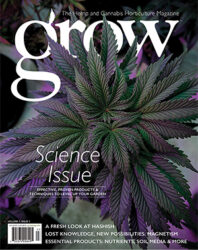Organics have always been close to my heart. My family has a long line of organic farmers from the Midwest who continue to inspire the passion, hard work, and dedication necessary to grow food without chemicals. They migrated to Southern California in the ‘60s, where my second cousin grew organic produce for the still famous Ocean Beach People’s Co-op in San Diego. I grew up there, surfing and skateboarding, understanding the value of a healthy lifestyle thanks to these pioneers. By the late ‘90s, when my wife and I got together at San Diego’s first Medical Marijuana Cooperative, not only did we grow organic cannabis, we encouraged everyone to make lifestyle and dietary changes as well.
The need for organics, eco-friendly farming practices, and sustainable farming techniques is a phenomenon of the 20th century and more important today than ever before. In 1924, the father of biodynamic farming, Rudolph Steiner, gave what could be considered the first organic horticulture course to a group of farmers, but the term “organic” didn’t come about until 1940. This came from the concept of “the farm as an organism,” coined in the book “Look to the Land” by Walter James, a Lord of Northbourne in Kent, England.
J.I. Rodale brought this concept to the United States when he founded The Rodale Research Institute and “Organic Farming and Gardening” magazine in 1947, soon after the end of WWII. The Third Reich had given rise to deadly new synthetic chemicals like distillate pesticides and synthetic explosives, and the corporations that created DDT and aluminum nitrate began promoting and selling these products for use in conventional mono-crop farming methods and “the war on food.”
It wasn’t until the ‘70s that the first organic certification organization came into existence. California Certified Organic Farmers started in Santa Cruz in 1973, followed by Oregon Tilth Certified Organic in 1982. By the early ‘90s, there were more than 20 of these organizations spread across the nation helping consumers identify food grown with benefits of ecological farming without these synthetic chemicals.
The US government wanted to take control, however, and began its conquest by passing the Organic Foods Production Act in 1990. This required the USDA to develop nationwide standards for organic products in preparation for the creation of the National Organic Program (NOP). The final rule for the establishment of this program–published in the Federal Register in 2000 and in full effect in November 2002–made the word “organic” illegal for use by anyone outside Federal Certification. This is where things get sticky for the cannabis industry.
As a Schedule 1 (Class 1) drug, the USDA, as part of the Executive Branch of the Federal Government, cannot legally provide its exclusive NOP certification services, or allow the use of the word “organic,” anywhere within the booming cannabis industry. This makes it difficult for consumers to determine how it was grown.
Even though cannabis is a large-scale plant crop intended for human consumption and subject to the same threats of contamination from WWII-derived chemicals, the situation is currently being ignored by the US Government just as they did in the food supply for decades at the end of the last century. As a result, the same type of independent certification companies have sprung up to fill the gap, focusing on eco-friendly farming practices and sustainable farming techniques. This time, however, the government owns the word “organic,” which is the only word people have become accustomed to. So what do we do?
I believe the first thing is to begin using different language for a cannabis certification program that is clearly understood and can’t be confiscated or legislated away from use by the people. I was in Barcelona recently and discovered that, in European countries, crops grown without pesticides and synthetic chemicals is referred to as “ecologic” or “ecologically grown,” which I think this is a much better descriptor. In the US, “organic” has simply become an expensive buzzword that’s lost its meaning. So, when you read an article stating that there is no nutritional difference between organic and conventional produce, you can believe it because “organic,” and the way it’s applied in agriculture today, no longer means what it did prior its takeover in 2002.
One of the reasons for this is the multiple and contradictory definitions of the word itself, especially in the realms of organic chemistry and organic compounds in particular. According to the American Chemical Society, “Organic chemistry is the study of the structure, properties, composition, reactions, and preparation of carbon-containing compounds, which include not only hydrocarbons (petroleum) but also compounds with any number of other elements, including hydrogen, nitrogen, oxygen, halogens (fluorine (F), chlorine (Cl), bromine (Br), iodine (I), and astatine (At), phosphorus, silicon, and sulfur. This branch of chemistry was originally limited to compounds produced by living organisms but has been broadened to include human-made substances such as plastics. The range of application of organic compounds is enormous and also includes, but is not limited to, pharmaceuticals, petrochemicals, food, explosives, paints, and cosmetics.”
In other words, since 1947, the poisonous chemicals created in WWII have become legal and fall under the scientific definition of “organic.” This allows a devious company to spray an illegal pesticide on a crop and still call it “organic” due to a language and definition technicality. According to the description above, even the fluoride contamination of the water supply can be termed “organic,” which makes all of this confusing. I believe we can begin to turn this around by changing the language we use to describe clean, healthy agricultural practices and raise the standards under which all our crops are grown.
Even though I am the first “Federally Recognized Organic Cannabis Farmer in the United States,” I intend to change the language of what I do to “ecologic” and “ecologically grown.” I’ve been a big proponent of these independent certification programs for a long time and see them as a way to raise the bar when it comes to helping people identify clean food and cannabis.
So, with a lifetime of passion and hands-on experience growing clean healthy crops myself, it seems like a good time to throw my hat in the ring and officially announce “Farmer Tom Certified, Ecologically Grown.” This is a program set up similarly to Oregon or Washington Tilth as a vehicle to oversee the cannabis farms we work with. Look for us as we hope to have it up and running very soon.

